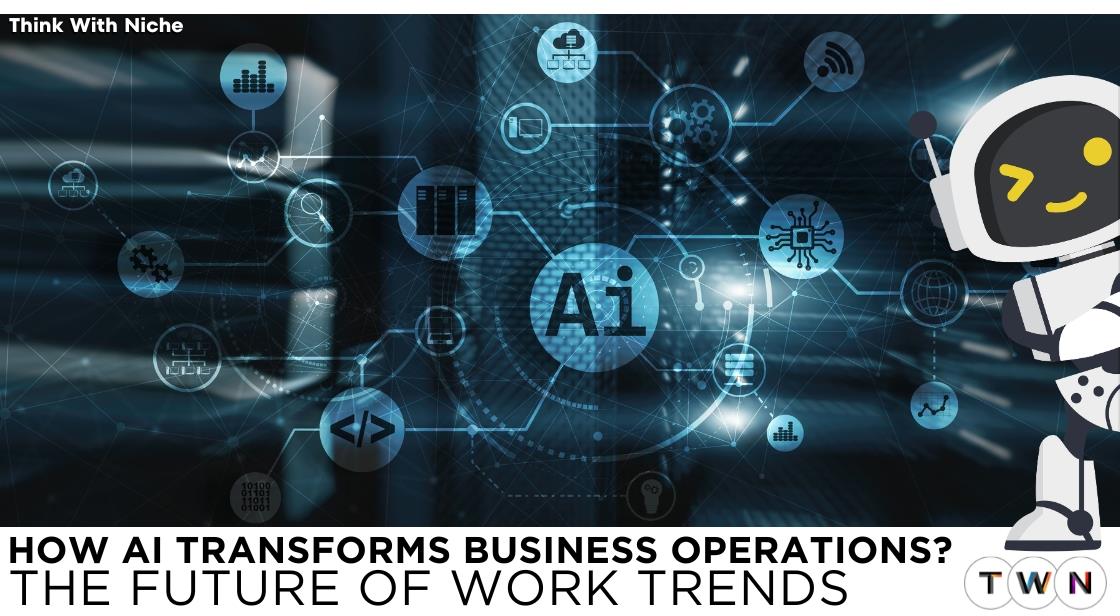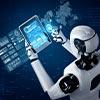How AI Transforms Business Operations?

Blog Post
The rapid evolution of Artificial Intelligence (AI) has initiated a profound transformation across industries, fundamentally reshaping how businesses operate and how work is approached. In this comprehensive exploration, we delve into the realm of AI's impact on modern business operations, unveiling the significant advancements and future trends shaping the landscape of work.
Artificial Intelligence, with its ability to automate tasks, optimize processes, and elevate human potential, is heralding a paradigm shift in business operations. By seamlessly integrating AI-driven tools and technologies, organizations are witnessing a revolution in productivity, decision-making, and customer experiences.
This article serves as a guide through the multifaceted impact of AI across various facets of business operations. From automation streamlining mundane tasks to AI-powered data analytics revolutionizing decision-making, we unravel the transformative potential of AI in reshaping workforces and fostering a future where human capabilities synergize with intelligent technologies.
Join us on this exploration as we navigate the intricate landscape of AI's transformative influence on business operations, future work trends, and the evolving nature of the modern workforce.
Artificial intelligence (AI) is rapidly transforming the world around us, and the business landscape is no exception. AI is revolutionizing daily business operations, automating tasks, enhancing productivity, and reshaping the future of work. In this article, we will explore how AI is impacting various aspects of business operations and discuss the future trends that are shaping the AI-powered workplace.
How AI Transforms Business Operations: Future Work Trends?
1. AI Automation: Unleashing Human Potential and Driving Strategic Innovation
Artificial intelligence (AI) is rapidly transforming the way businesses operate, ushering in a new era of automation that not only streamlines processes but also redefines the roles and potential of human workers. By automating repetitive and mundane tasks, AI is freeing up valuable human time and resources, allowing employees to focus on more strategic, creative, and intellectually stimulating endeavors.
Automation Revolutionizing Repetitive Tasks
AI algorithms are revolutionizing the automation of repetitive tasks, enabling businesses to reduce manual labor, improve efficiency, and minimize errors. These algorithms can handle a vast array of tasks, from data entry and customer service interactions to complex financial analysis and marketing campaigns.
-
Data Entry Automation: AI can automate data entry, extracting information from documents, spreadsheets, and other sources, eliminating the need for manual data entry and reducing the risk of human error.
-
Customer Service Automation: AI-powered chatbots can provide 24/7 customer support, answering frequently asked questions, resolving common issues, and even making personalized recommendations.
-
Financial Analysis Automation: AI can analyze complex financial data, identifying patterns, trends, and anomalies, providing valuable insights for strategic decision-making.
-
Marketing Campaign Automation: AI can automate marketing campaigns, optimizing ad placement, targeting specific audiences, and measuring campaign performance.
Elevating Human Workers to Strategic Heights
The automation of repetitive tasks by AI is not about replacing human workers; it's about empowering them to focus on higher-value activities. By removing the burden of mundane tasks, AI allows employees to utilize their skills, expertise, and creativity to contribute more meaningfully to the organization.
-
Strategic Thinking and Problem-Solving: Automation frees up employees' time to engage in strategic thinking, analyzing complex problems, and devising innovative solutions.
-
Creativity and Innovation: With AI handling routine tasks, employees can devote their energy to brainstorming new ideas, developing creative solutions, and enhancing customer experiences.
-
Leadership and Decision-Making: AI provides valuable insights and data-driven recommendations, enabling employees to make informed decisions and lead their teams more effectively.
Fostering a Skilled and Adaptable Workforce
The rise of AI necessitates a transformation in the workforce, requiring individuals to develop new skills and adapt to the changing technological landscape. Employers must invest in training and development programs to equip their employees with the skills needed to work alongside AI and contribute to the future of work.
-
Upskilling and Reskilling: Employees need to be upskilled or reskilled to develop the technical and soft skills required for AI-powered jobs, such as data analysis, machine learning, and user experience design.
-
Adaptability and Lifelong Learning: Embracing a digital mindset and cultivating a commitment to lifelong learning are essential for employees to thrive in the evolving AI-driven workplace.
2. AI-Powered Insights: Revolutionizing Business Decision-Making
In today's data-driven world, businesses are constantly seeking ways to extract meaningful insights from the vast amounts of information they collect. Artificial intelligence (AI) is emerging as a game-changer in this realm, providing businesses with the tools and capabilities to analyze data faster, more accurately, and more comprehensively than ever before.
Also Read : Why is Business Insurance important for Entrepreneurs?
Harnessing the Power of Data Analytics
AI-powered data analytics tools can process vast amounts of data, including structured and unstructured information, from a variety of sources. This includes data from internal systems, social media, customer interactions, and external sensors. AI algorithms can analyze this data to identify patterns, trends, and correlations that would be difficult or impossible to identify manually.
Unveiling Hidden Patterns and Unlocking Insights
The ability to analyze large datasets and uncover hidden patterns is a key advantage of AI-powered data analytics. These insights can inform decision-making at all levels of an organization, from strategic planning to day-to-day operations. For example, AI can be used to:
-
Identify customer preferences and buying patterns, enabling businesses to personalize marketing campaigns and product offerings.
-
Predict demand fluctuations and optimize inventory management, reducing costs and minimizing stockouts or overstocking.
-
Analyze customer feedback and social media sentiment to identify areas for improvement and enhance customer satisfaction.
-
Detect fraud and anomalies in financial transactions, reducing losses and protecting financial assets.
-
Predict equipment failures and schedule maintenance proactively, minimizing downtime and maximizing productivity.
Real-Time Data Analysis for Timely Decisions
One of the most significant advantages of AI-powered data analytics is its ability to process data in real time. This real-time processing enables businesses to make informed decisions based on the most up-to-date information, allowing them to adapt quickly to changing market conditions and customer preferences.
Gaining a Competitive Edge with Data-Driven Decisions
Businesses that effectively leverage AI-powered data analytics are able to gain a competitive edge in several ways:
-
Improved efficiency and cost savings: AI can help businesses identify areas of waste and optimize processes, leading to cost savings and improved profitability.
-
Enhanced customer satisfaction and loyalty: By understanding customer needs and preferences better, businesses can tailor their products, services, and interactions to provide a more personalized and satisfying customer experience.
-
Reduced risk and uncertainty: AI can help businesses identify and mitigate potential risks, making decisions with greater confidence and reducing the likelihood of costly mistakes.
-
Innovation and competitive advantage: AI can help businesses identify new opportunities and develop innovative products and services, giving them a competitive edge in the market.
3. AI-Enhanced Customer Experiences: Driving Satisfaction, Loyalty, and Growth
Artificial intelligence (AI) is revolutionizing the way businesses interact with their customers, transforming the customer experience into a personalized, seamless, and more satisfying engagement. AI-powered tools and technologies are enabling businesses to enhance customer interactions across all touchpoints, from pre-sale inquiries to post-purchase support.
AI Chatbots: 24/7 Customer Support at Your Fingertips
AI chatbots are playing an increasingly prominent role in customer service, providing 24/7 support to customers worldwide. These intelligent chatbots can handle a wide range of inquiries, from answering frequently asked questions to resolving common issues and even making personalized recommendations. They can also handle multiple conversations simultaneously, ensuring that customers receive prompt and responsive support.
Virtual Assistants: Navigating Customer Journeys with Ease
AI-powered virtual assistants are emerging as valuable tools for assisting customers with various tasks throughout their journey. These virtual assistants can help customers book appointments, make purchases, track orders, and manage their accounts. They can also provide personalized recommendations and offer assistance with troubleshooting issues.
Conversational AI: Personalized Interactions and Customer Insights
Conversational AI tools, such as natural language processing (NLP) and natural language understanding (NLU), are enabling businesses to have more natural and personalized conversations with their customers. These tools can analyze customer interactions to identify sentiment, extract key information, and provide appropriate responses. They can also tailor recommendations and offers based on individual customer preferences.
Predictive Analytics: Anticipating Customer Needs and Proactive Support
Predictive analytics, powered by AI, is enabling businesses to anticipate customer needs and proactively provide support. By analyzing customer data, including past interactions, purchase history, and online behavior, predictive models can identify potential issues or dissatisfaction before they arise. This allows businesses to reach out to customers proactively, offering assistance or resoling potential problems before they escalate.
AI-Powered Personalization: Tailored Experiences for Individual Customers
AI is enabling businesses to create truly personalized customer experiences. By analyzing customer data, AI algorithms can identify individual preferences, interests, and past behaviors. This information can then be used to personalize marketing campaigns, product recommendations, and even website content. Personalized experiences can enhance customer satisfaction, increase engagement, and foster loyalty.
4. AI-powered tools and software
AI-powered tools and software have revolutionized the way businesses handle routine tasks, offering a significant shift in productivity and efficiency. These tools, leveraging artificial intelligence, have evolved to autonomously execute repetitive tasks on a predefined schedule.
By entrusting these responsibilities to AI, employees gain the freedom to focus on more complex and innovative endeavors that require human creativity and critical thinking.
In recent years, advancements in AI technology have led to a profound impact on various industries. For instance, in the realm of data analysis and management, tools embedded with AI capabilities have transformed the way businesses handle vast amounts of information.
Take Microsoft Excel or similar charting software—AI-powered algorithms now enable these platforms to swiftly apply intricate formulas for data analysis. Instead of employees spending extensive time sifting through voluminous data columns, AI tools can instantaneously flag instances where numbers breach specific thresholds or patterns.
An illustrative example of the transformative power of AI-driven tools is witnessed in customer service. AI-powered chatbots have become integral in handling customer inquiries and support.
These chatbots, equipped with natural language processing (NLP) capabilities, efficiently address customer concerns and provide immediate assistance round the clock. Companies like Zendesk, Intercom, and ChatGPT have deployed AI-driven chatbots that understand and respond to customer queries, alleviating the burden on human support teams.
Moreover, AI-powered software in marketing automation has also gained significant traction. These tools utilize machine learning algorithms to analyze consumer behavior, predict trends, and personalize marketing campaigns. Platforms such as HubSpot, Marketo, and Mailchimp leverage AI to automate email marketing, content curation, and customer segmentation, allowing marketers to optimize their strategies with data-driven insights.
The latest advancements in AI-powered tools continue to redefine business operations across various sectors. From streamlining data analytics to enhancing customer experiences and automating marketing efforts, the integration of AI-driven technologies is reshaping how businesses operate and innovate in the modern landscape.
5. AI Reshaping the Workforce: Navigating the Future of Work
Artificial intelligence (AI) is not just automating tasks; it is fundamentally reshaping the workforce, creating new opportunities, and altering the skills and knowledge required for many traditional jobs. While some tasks are being automated, new AI-powered roles are emerging, demanding a workforce that is adaptable, skilled in AI technologies, and capable of working seamlessly alongside intelligent machines.
Redefining Roles and Creating New Opportunities
AI is not replacing human workers; instead, it is transforming the nature of work. Routine and repetitive tasks are being automated, freeing up human workers to focus on more strategic, creative, and value-adding activities. AI is also creating new jobs in areas such as AI development, data science, and AI ethics.
The Demand for AI-Specific Skills
As AI becomes more prevalent, there will be a growing demand for skilled workers who can develop, implement, and maintain AI systems. This includes skills in machine learning, artificial neural networks, computer vision, and natural language processing.
Upskilling and Adaptability
AI is changing the skills and knowledge required for many traditional jobs. Workers need to be adaptable and willing to upskill to keep pace with the changing technological landscape. This includes developing skills in critical thinking, problem-solving, creativity, and communication.
Future Trends in AI-Powered Work
Looking to the future, AI is expected to further transform the workplace in several ways:
-
AI-powered collaboration: AI will increasingly be used to facilitate collaboration between humans and machines, enabling more efficient and effective work processes. Humans will provide expertise and creativity, while AI will handle data analysis, automation, and real-time decision-making.
-
AI-driven personalization: AI will be used to personalize work experiences, providing each employee with the tools and resources they need to be most productive. AI will tailor training, development, and work assignments to individual strengths and preferences.
-
AI-augmented learning: AI will enhance employee training and development, providing personalized learning experiences that cater to individual needs and learning styles. AI-powered tutoring systems, adaptive learning platforms, and virtual coaching will become increasingly common.
Conclusion:
Artificial intelligence is revolutionizing business operations and the future of work. By automating tasks, enhancing productivity, and providing valuable insights, AI is empowering businesses to achieve greater efficiency, innovation, and growth.
As AI continues to evolve, it will play an increasingly important role in shaping the workplace of the future.
AI-powered tools and software are revolutionizing the way we work, automating repetitive tasks, providing valuable insights, and enhancing customer experiences.
As AI continues to evolve, it will play an increasingly important role in shaping the future of work, empowering businesses to achieve greater efficiency, innovation, and growth, while also opening up new avenues for skilled workers to contribute to the digital era.
You May Like
EDITOR’S CHOICE












